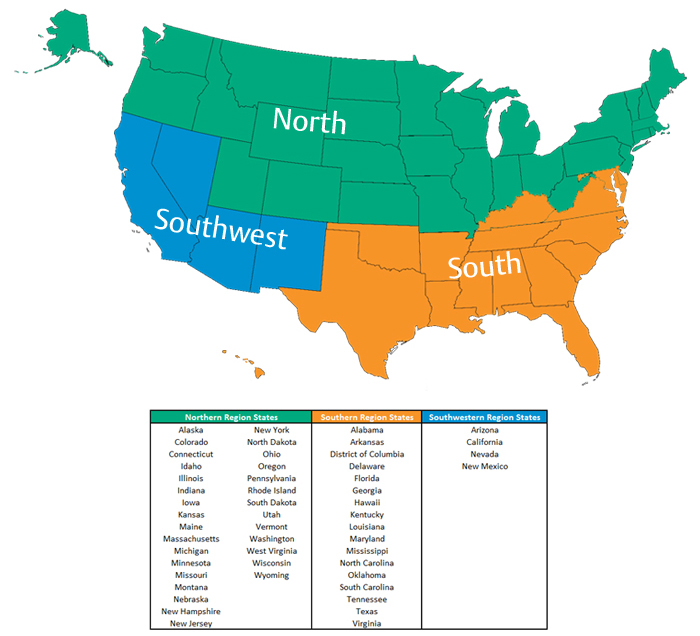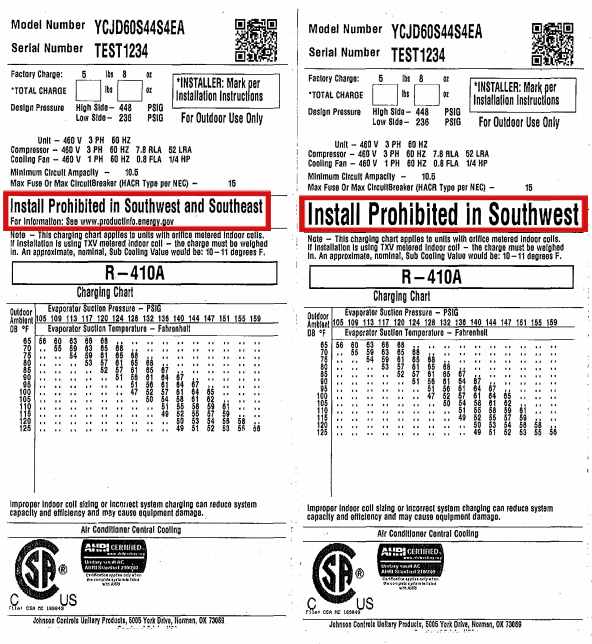
Residential Regional Standards Enforcement Rule in Progress
Reference: DOE NOPR
Most appliances we buy are governed by energy efficiency regulations. The Department of Energy (DOE) sets efficiency standards for various appliances from time to time, including those for central air conditioners and heat pumps. The changes in efficiency standards for air conditioners are usually transparent to homeowners as they typically rely on a contractor for guidance. While contractors are a great source of information, there are some unique changes to the latest round of efficiency standards that are important for any homeowner to be aware of.
New efficiency standards for central air conditioner and heat pumps went into effect January 2015 and they are very different from previous standards set. Historically, those criterions were the same across the entire country, but now it is divided into three regions; each of which now has their own set of standards to follow. Here they are:

Enforcement Challenges with Regional Standards
One variation that can be noted is that heat pumps have a national standard, while air conditioners have regional standards. This creates a unique challenge because manufacturers are allowed to still make 13 SEER units for the north, but these units are illegal to install in the south or southwest.
For example, imagine you live in Cincinnati, Ohio and your friend resides just across the bridge in Florence, Kentucky. Even though you are close in proximity, you each will have a different minimum SEER requirement. You personally are able to get a 13 SEER air conditioner, while your friend cannot. This is because of the region differentiations – Kentucky is classified as part of the southern region and Cincinnati, the northern.
Under this new enforcement regulation currently in progress, the DOE will not hold a homeowner liable for any incorrect installation, but it is certainly helpful to educate yourself on the regulations and sources of information.
Labeling
Manufacturers agreed to add a voluntary label to all outdoor air conditioning units that cannot be installed in certain regions. Here is an example of the proposed label:

Reference: Regulations.gov
As you can see, the label clearly calls out the regions where the unit is prohibited. More information on the regions and the sates that belong to each region is provided by Energy.gov.
What to Lookout For
If the DOE finds that a contractor, distributor, or manufacturer knowingly sells equipment to someone that installs equipment wrongfully, they will be determined a “routine violator.” The DOE publishes a list of these routine violators, so when you hire a contractor it is a good idea to be sure he or she is not listed. You can do so here.
Record Keeping
There is no record-keeping requirement for homeowners, but it is highly recommended that you take note of and save:
- Manufacturer’s documents
- Contractor’s information
- Date of installation
How to Talk to Your Contractor about Regional Standards
A contractor is likely to respect you even more if you show that you have done your homework and are familiar with the SEER levels for your region. This not only allows you to better understand the type of unit you are purchasing, but also discourages any bad-seed contractors from trying to illegally install an incorrect air conditioning unit.
Reference: CAC Enforcement NOPR – section F
Amended Standards Impact Based on Region
If you live in the North:
The amended standards that impact the northern region are based on the product’s date of manufacture.
- Units manufactured before January 1, 2015, must meet the standards that were in effect before January 1, 2015.
- Units manufactured after January 1, 2015, must meet the new standards.
Reference: Energy.gov
If you live in the Southeast or Southwest:
The amended standards that impact the Southern region are based on date of installation. Therefore, units installed on or after January 1, 2015, should meet the new standards. The DOE has issued an enforcement policy that they will not penalize the individual who installs units manufactured prior to January 1, 2015. In light of this, an installer may offer to sell you a noncompliant unit that was manufactured in 2014. After July 1, 2016, however, DOE will strictly enforce the standards.
In Summary
When investing a large amount of money into a new air conditioning unit, it is very important to also invest time and research into the regulations standardized by the DOE.
Effective January 2015, air conditioners must meet the criteria recognized for the individual unit, based upon the region you live in and the SEER rating level of the appliance. This knowledge will not only make you feel more confident and at ease with your purchase, it will help ensure the right products are legally and accurately installed.
Traditionally, energy efficient standard regulations were solely the responsibility of the contractor and manufacturers for an air conditioning unit or heat pump. However, with these recently implemented changes established by the DOE, the time is right for homeowners to take an initiative to better understand their region and SEER level regulations.
**If you believe your air conditioner installer has installed an illegal air conditioner, you may report it to DOE at EnergyEfficiencyEnforcement@doe.gov or by phone at 202-287-6997.


